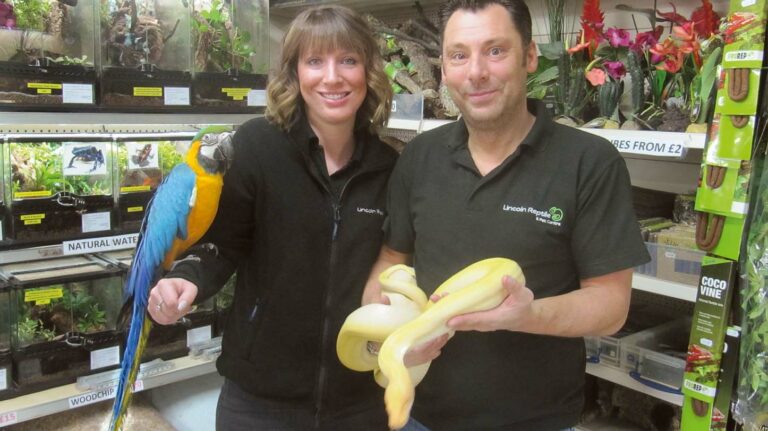Lincoln Reptile and Pet Centre is one of the first pet shops in England to achieve a five-star, three-year licence under the new Animal Activities Regulations. Owners Andrew and Alyss Rogers explain what they had to do to achieve this top rating.
When their December 2018 inspection rolled round, Andrew and Alyss Rogers were hoping they’d get their licence renewed for a year under the new Animal Activities Licensing (AAL) regulations, but were delighted to be awarded the highest five-star rating. “Everybody wants the three-year licence, but at the time, we would have been happy with the one-year licence because everything was unknown,” said Alyss.
Like many in the pet trade, they first learned of the impending change to the legislation in 2017 when the Government announced it was holding a consultation. “We started to delve into it and joined several Facebook pages,” said Andrew.
Coincidently, the couple had already been assessing the sizes of their vivariums and had decided to ditch their smaller vivs in favour of larger units. He said: “We changed all our vivs about two years ago, but that was on our agenda as we want to show customers exactly how animals should be kept, with real-life examples. We have always strived to provide the right environment for the animal.”
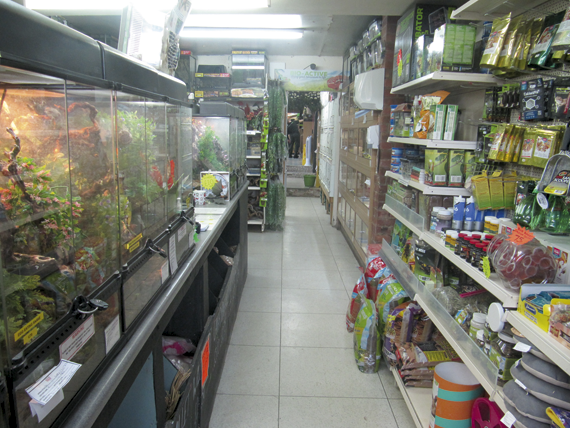
It’s a Tardis! Shop stretches down a long corridor with shelves and animal enclosures lining both sides
The total cost of replacing vivariums and enclosures came to about £15,000, but was money well spent, they said. “We have never been so mucky,” said Alyss. “We worked on installing the new units after hours over two weeks, some times working until midnight.”
The store now has around 90 vivariums, and each is set up like a display tank – but that’s intentional as they want customers to see what an ideal set-up looks like, and they also want to encourage the sale of décor and tank accessories. They are now branching into live plants along with custom-made waterfall features.
When the Regulations and Guidance Notes were published on October 1, they saw that the legislation was wrapped in a five-star rating system, with the potential to be issued a licence valid for three years. The spanner in the works was the amount of paperwork that had to be completed in the two-and-a-half months before their mid-December inspection, and at the busiest time of the year!
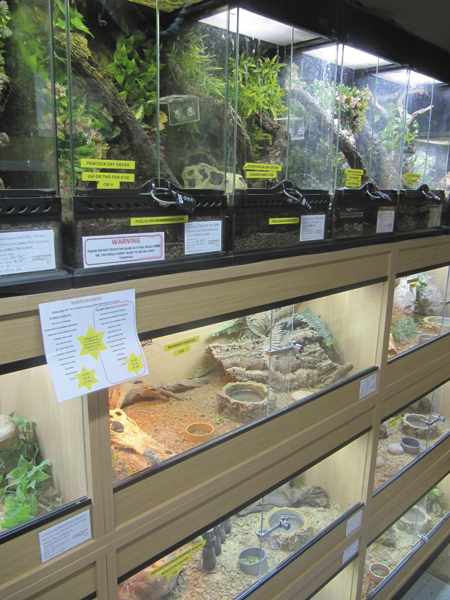
“We have always done as standard what the regulations said we should do, but now we have to keep records on everything,” said Andrew. “Plus we needed to show written evidence of our procedures, which we used to do automatically such as feeding snakes, cleaning our reptile enclosures and monitoring health.”
Alyss added: “For example, we already kept logs on feeding our snakes, because if they did not feed three times in a row, we’d remove them from sale. But now we have to record everything.”
As there were no industry-standard templates to work from, she undertook the research side of things and the two spent hours brainstorming content and format for both the procedures and record keeping, apart from the more than 10 hours just typing everything out. In total, they compiled 25 written procedures and devised record sheets for all the variables that need recording. “Our paperwork has gone up from absolutely next to nothing to five different sheets we have to fill out on a daily basis,” he added.
Each enclosure also has to display care information about the species and the creature’s origins. “This to me is a good thing, yes, it’s extra expense to sort and time, but it offers more information to customers and enables better decisions as they can see what is required of that species, and that can only be better for the welfare of the animals,” he said.
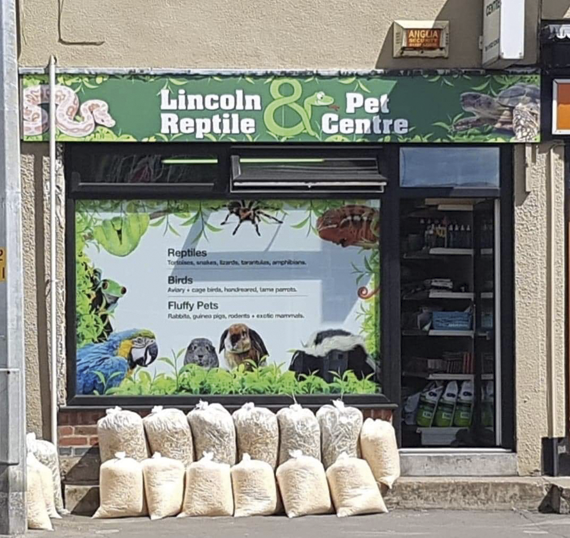
The lack of templates is a weak spot, they said. “The whole point was to introduce industry-wide standards, but without these, one local authority could potentially approve what one retailer has done, but another could say it’s not good enough,” said Andrew.
Chris Newman at REPTA has been an absolute help in navigating the maze of the legislation, they said. “I have sent him questions at 9-10pm at night and he has responded within minutes if not the very next day. I have a lot of time for him,” said Andrew.
The new Regulations have seen some shops close – the couple has seen around 10 shops around the country shut their doors as a direct result. “The good shops have done what was required but others have shut, such as those with 12-inch vivs and who were not going to change them,” he said.
There are, however, some questionable aspects to the regulations, he said. For example, among their shop pets is Buddy, a rather vociferous parrot who rules the roost behind the counter. Buddy lives perfectly happy in a 4½’ x 3′ x 4’cage. However, if the Rogers wanted to sell African grey parrots, each would have to be kept in a 7′ x 7′ x 5′ cage – yet pets can have smaller cages. “It’s excessive, especially as most birds will stress in captivity if they are kept in too big a cage,” he said. “This is the ridiculous side of the new regs.”
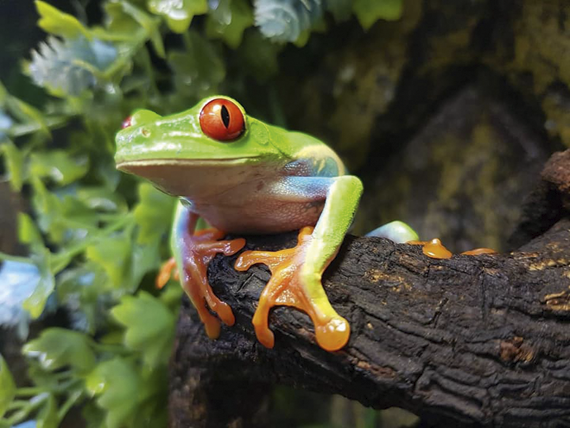
Red eyed tree frog (All animal pictures were taken by the Rogers)
But back to the day of the inspection and their local licensing officer (who is an animal warden and also in charge of public protection and anti-social behaviour) had sub-contracted the inspection to a vet who specialises in exotics including reptiles. “We’ve been told we will have to pay for the vet’s visit and travel expenses,” he said, “but we’ve not had an invoice yet. Our licence has cost £240, but I am going to challenge paying the vet’s fee. There is no clarity on what it will cost.”
What will March bring?
Lincoln Reptile and Pet Centre sources all of its reptiles from Europe – Alyss and Andrew travel to the Continent six or so times every year and are accredited, fully insured European couriers for livestock.
“We’d rather go to Europe for our reptiles,” said Andrew. “Our customers want to know how the animal has been looked after, and we have found that breeders in Europe have much higher standards, whether it is record keeping, husbandry, maintenance…and their back-up service is second to none.”
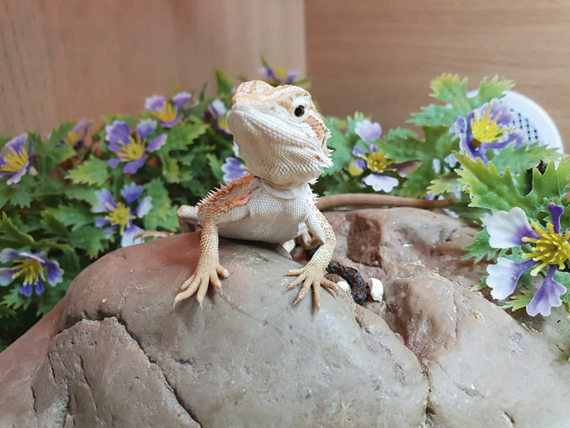
Bearded dragon
Huge questions hang on what will happen with Brexit and the March deadline for leaving the EU. Current thinking is that paperwork will definitely increase, yet apart from import/export documentation, no one knows if paperwork for CITES species will change as well. The bottom line, said Andrew, is that businesses have to be reactive rather than proactive. “We just have to wait and see. With France, for example, at the moment, whenever they see a CITES animal, they immediately say ‘No, no export’, but that is not the point of CITES.”
For example, though all tortoise species are listed on CITES, they are sub-divided into annexes and those on Annex A require a sales certificate within the EU whereas those on Annex B do not require certification. So while Horsfield tortoises do not require a certificate, the Hermann and Spur-thighed tortoise do.
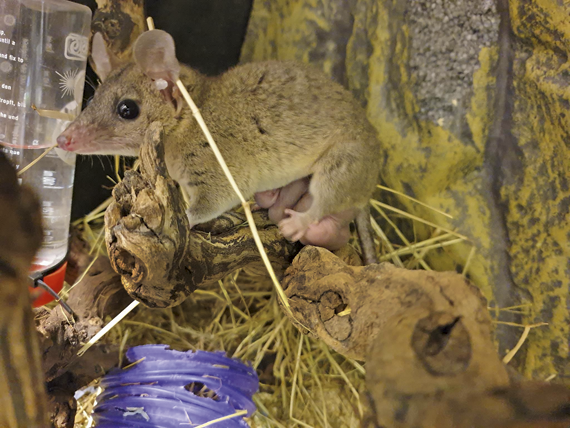
Short tailed possum
To complicate matters, not everyone can tell the difference between, for example, a Hermann and a Horsfield tortoise by sight.
The pet shop also sells a wide variety of birds and some mammals such as mice, possums and pygmy hedgehogs, the latter two which are bred onsite. All birds come from a local breeder, who is well known to the Rogers.
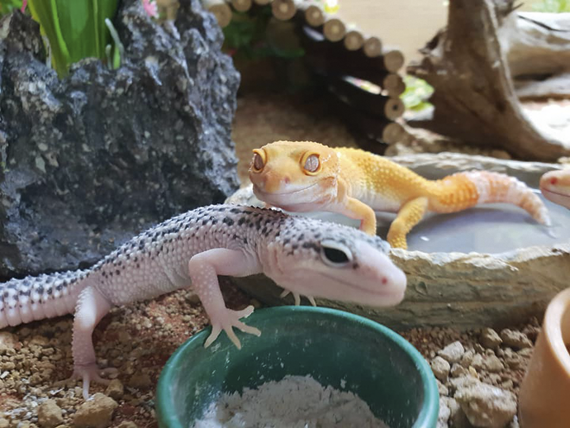
Leopard geckos
Specialist, not generalist
Alyss initially took over the shop with her parents, Wendy and Derek Dickinson, which they five years ago renamed Lincoln Reptile and Pet Centre. Alyss was interested in reptiles and over the course of a couple of years, became well versed in their husbandry. When her parents retired, Alyss took over and Andrew got more involved until he eventually left his job to come on board full-time. The shop also shed its traditional pet shop image to focus on reptiles. It was about becoming a specialist rather than generalist, they explained. “As cat and dog product suppliers, you cannot stock and beat the likes of Pets at Home and the Range and be successful,” he said.
“We could make 50p profit on a bag of dog food,” said Alyss, “but animals on display are a far more interesting prospect. Mum and dad liked the traditional pet shop, where people converged here and chattered about the weather and bought a bag of dog food. When they retired, I wanted to change the focus.”
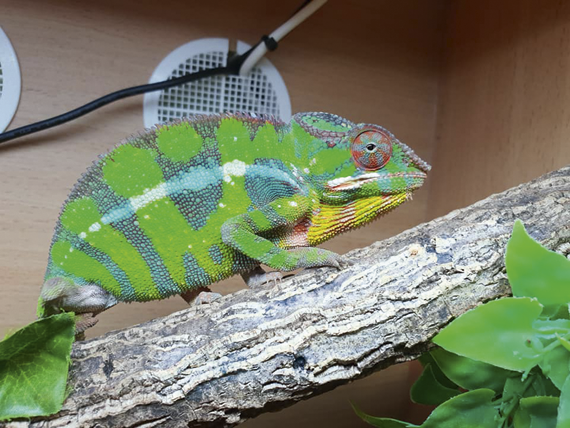
Panther chameleon
Once the shop developed a reputation for its reptiles and livestock, sales were heavily geared to livestock and a few set-ups, but over the past six months the sales ratio has changed to roughly become 60% animals and 40% set-ups. This, they say, is due to their streamlining suppliers and buying direct where possible. Any discounts or promotions are passed directly to customers, making their prices far more competitive.
This Christmas, sales were the best ever, they said. “Normally Christmas trade kicks in during the second week of December. This year, it started towards the end of November,” said Alyss, adding they sold in the region of 80 vivariums in the four weeks. “We had to keep re-ordering stock,” she added.
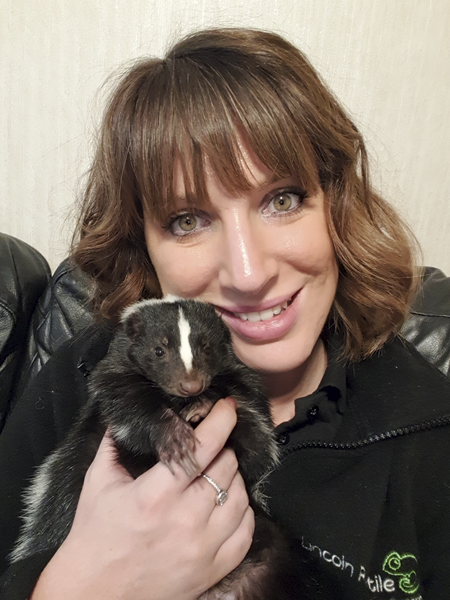
Alyss with Bea the skunk
Andrew said: “A lot of our growth is because we are being more savvy. If we get a deal, we pass that on to the customer. We have found that pricing is critical – if you do not supply the product at the right price, the customer does not buy from somewhere else but will just not buy the product. Take UVs as an example, if you price these too high, although they should be replaced every six months, the customer will stretch it out to a year instead. Priced right, they will change at six months, so your sales go up and ultimately, it’s better for the animal.”
This focus and priority on the animal is made abundantly clear – whether it’s a £10 hamster or a £600 royal python, the Rogers have a strict policy that unless the set-up is being bought from them, they must see a picture of the intended set-up. They’ve been doing this for about three years, and just the day before lost two sales of £500 because the potential buyers did not have an image of their kit with them.
Their reputation is spreading far, and many new customers walk in their doors saying they have been referred to them for reptiles – usually bearded dragons and leopard geckos – by Pets at Home. The couple have also often had to correct the mistakes made by other retailers who have either sold incorrect equipment or given incorrect information and advice.
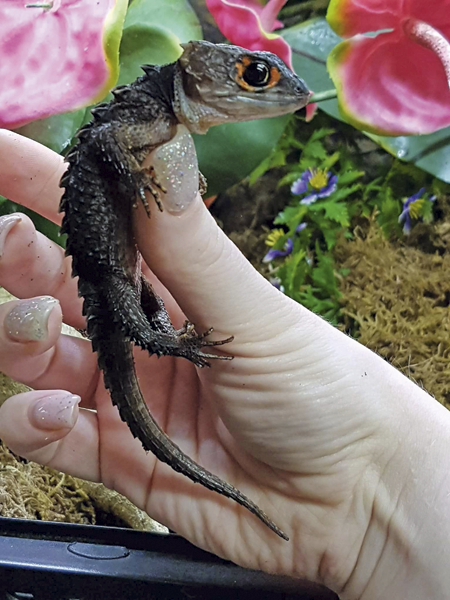
Red eyed crocodile skink
Of clicks and followers…
Facebook is now working against businesses, said Andrew, as the social media platform’s new algorithm stops non-paying businesses from being at the forefront of users’ pages and feeds. Their shop’s Facebook page has 66,500 followers, and prior to the new algorithm, would reach more than 80%. Now, it’s typically at the 7% mark.
Facebook changed its algorithm to combat the increasing prevalence of fake news, racism, sexism and Islamophobia, said Andrew. Thought at the same time this was introduced, Facebook launched a paid-for business service…
“People are falling out of love with Facebook,” he said. “The romance that built up over the last 10 years is now going and the relationship is not working for us any more. Live video is supposed to be the best way to get people to view your site. If they click on a video, they will then see your uploads for 30 days. We have 66,000 followers. In the past, if I put on a link for crested geckos we would see 500 likes, 150 comments and lots of shares. One of our links, that of crocodile skinks (which look like mini dinosaurs) had 84,000 shares. Now if I post anything on Facebook, we get maybe 10 to 15 clicks and three comments. We put a lot of effort to getting ourselves out there, but Facebook is now really hard work.”
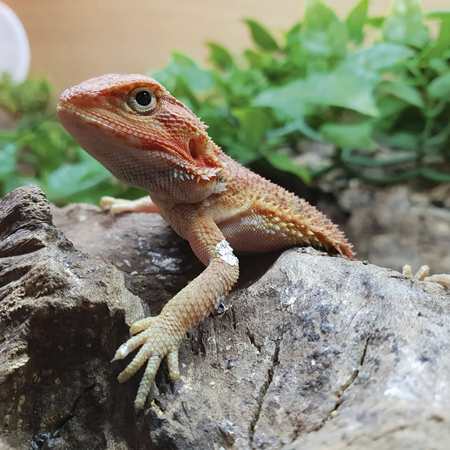
Bearded dragon
The two are exploring other social media platforms – they currently have 4,500 followers on Instagram and are looking at Google, which has launched a platform which offers Messenger and a Follow function.
The downside of communication online is that people will send in questions at 1.30am…and if a reply is not immediately forthcoming, will follow up with question-marks. “Even though I am normally up at that time, I do not answer those questions then on principle,” he said.
The Internet also breeds the copycat phenomenon – all their postings on livestock follow a set format, said Andrew, kicking off with common name, scientific name, price and progressing to care information. “I can now see others are following how we do this. But that’s the nature of the business for you.”
They’ve also launched a new website for the shop, which ‘has gone mental’ – and that can only bode well for their new venture.
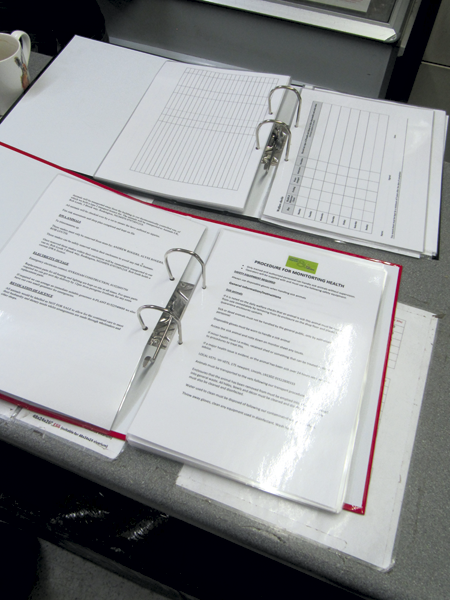
All procedures and records are kept in two folders ready for inspection
Looking ahead
Lincoln Reptile and Pets will be launching an ecommerce site later this year, selling kits and dry goods only. While a livestock list will be available, any interested purchaser will have to call to enquire and go through the same vetting process as walk-in customers.
For some reason, they have a number of customers in Scotland – one man even drove all that way to purchase a £50 Californian king snake. As such, they have started consciously marketing their shop to Scotland. Most other long-distance customers are happy to pay the £75 specialist courier charge.
Both Andrew and Alyss are looking for a new house to buy. At the moment they have a 40-foot storage container off-site, but by the time they leave the shop at about 6pm and then finish at the container, it’s easily 8.30pm when they get home. “It would be nice if we could get a house with enough land to put the container,” said Alyss, adding that they are also on the look-out for a bigger shop, preferably premises that are for sale rather than rent. Their current unit is very long – and quite narrow in places. “It’s all about finding the right location and right premises, so we are not rushing this.”
Once every two years they host an animal encounter experience – between 1,200 and 1,300 people stand in a queue pretty much all day that stretches down the street, with average waiting time of 45 minutes just to get into the doorway. “We also have an ice-cream van and staff will walk down the queue with some of the animals, just so that people have something to see,” she added. “It’s all good.”
And with a three-year licence, life at the moment just looks that bit better.
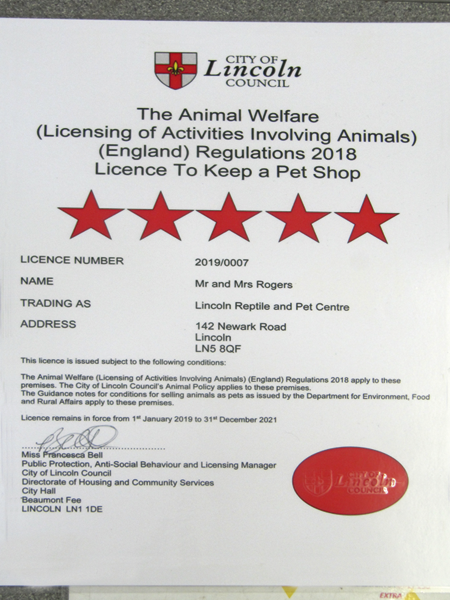
What are the Regulations?
The Animal Activities Licensing Regulations came into effect in England on October 1, 2018, and sit under the Animal Welfare Act 2006. They introduce a set of compulsory minimum standards for licensed animal establishments as well as a starred system by which all businesses are rated.
A business that meets the higher standards can gain a four or five-star rating and will qualify for a longer licence, eg. two or a maximum of three years as opposed to the traditional one-year licence.


